Conversations with a caregiver
Nusrat's story
Moments That Count has been developed and funded by Novartis Pharmaceuticals UK Limited and is intended for a UK general public audience.
Nusrat's story
With 30 years’ experience working for the NHS, Nusrat became caregiver to her cousin who, having just given birth to her fourth child, was diagnosed with Stage IV breast cancer. In the interview for Moments That Count, Nusrat notes how conversations with healthcare professional services up until the point of diagnosis had been about early breast cancer and highlights the importance of increased awareness around breast cancer patient experience on later stages.
Read Nusrat’s interview below for a first-hand account of her experiences being a caregiver to her cousin and discover the moments that count they had together.

Being diagnosed with breast cancer is always incredibly challenging – being diagnosed during a national lockdown is even harder. PatientXx, a Twitter pseudonym that Nusrat uses when telling her cousin’s story, was diagnosed right at the beginning of the COVID-19 pandemic in the UK. As a result, her experience often involved attending appointments alone, or with Nusrat by her side when allowed. “I think her first consultation that I have attended was in January, just before lockdown happened. After that she wasn’t allowed family and friends to come and visit, so that was really hard for her to have to go through something so serious alone.” – says Nusrat.
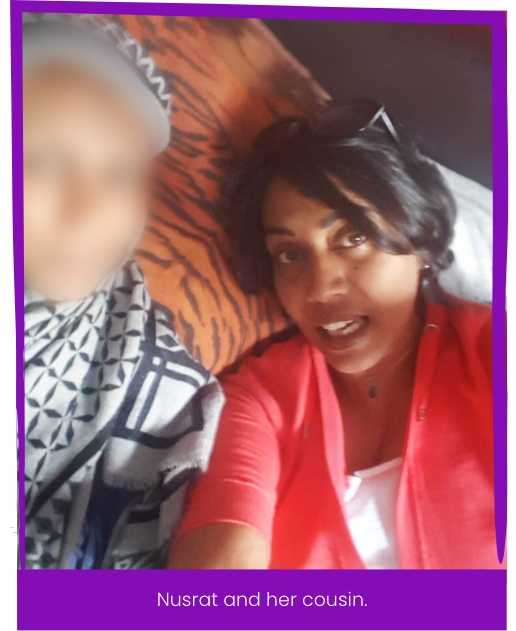
Being a part of British South Asian community PatientXx faced a challenge that so many patients in the UK, whose first language is not English, would be familiar with. The lack of readily available translated materials made it difficult to fully comprehend the treatment and care options available. While interpreters are crucial in such cases, Nusrat discovered that they could be a double-edged sword. The interpreters that were accessible in clinic would often add or withhold facts when relaying doctor’s speech to the patient, risking instilling false hope or offering distorted information.
“Translators would actually add their own two pennies’ worth.” – explains Nusrat - “I remember sitting back and letting them interpret to PatientXx. And then I’d say - you’ve said that wrong, you’ve translated that incorrectly, or you’ve missed a whole piece out there. And then eventually the staff realised that I was verbatim translating what needed to be said.”
“Getting the information about cancer in your language can be really difficult”, says Nusrat, “especially for people from the British Asian community.” While most people think the community consists mostly of Indian, Pakistani and Bengali people, actually there are more than 40 countries in Asia, with India alone having 300 dialects. As a potential solution Nusrat suggests that organisations avoid putting information in PDF format due to difficulty using Google Translate, ensuring broader access to a diverse public and allowing them to make informed decisions about their healthcare. It is also important for healthcare organisations to provide resources that are specifically tailored to diverse communities and educate healthcare professionals to help them provide the most appropriate support to everyone facing breast cancer, while taking into account cultural sensitivities and differences. “I think that doctors engage with ethnic minorities in a nervous way and not very openly.” – shared Nusrat – “You can sense it in the patronising tone in which they’re speaking, and you almost want to put a big sign up and shout - I’m human, just like you! Just treat me like a normal adult! Once they realise that you’re just like them, the barriers are broken down.”
One of the first things Nusrat did, when she stepped in as a caregiver for her cousin was setting up a WhatsApp group to make sure all the family members are aware and there is no place for damaging misinformation. “Being the kind of person I am, I want to know absolutely everything about my health, when given a choice. I’m aware that not everybody is like that, but I think if you provide the information then it’s up to them whether they want to take it on board or not. I would always share exactly what happened in the call with doctor, even record it with doctor’s permission. I’d also share links to Breast Cancer Now and explain exactly what it means. Every time anything happened, I would share it within that group, and it was hard because the family sometimes would not believe me.”
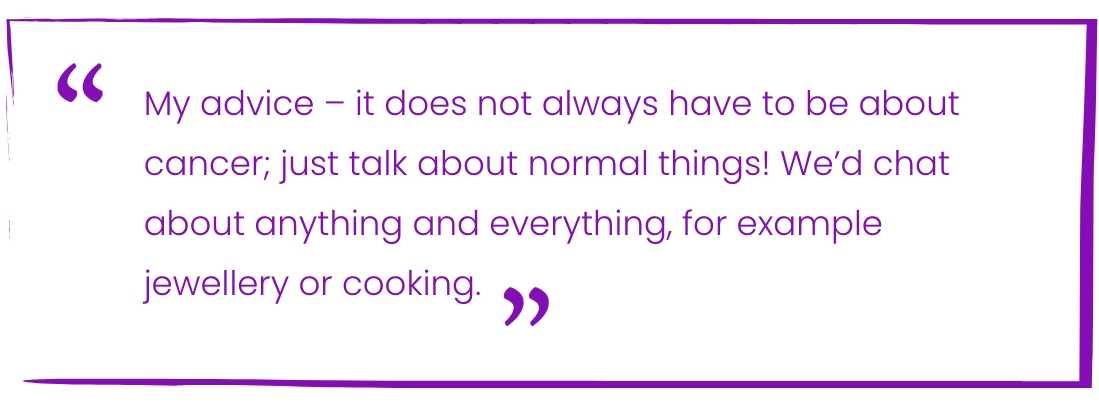
There are many advocates from the South Asian community, so Nusrat highlights the importance of representation and increased knowledge among this patient population. There are still a lot of misconceptions that exist in the South Asian community around breast cancer that are shaped by cultural beliefs, lack of awareness, and stigmatisation. In her own experience as a caregiver, Nusrat had to challenge the way her family talks about breast cancer, navigating the conversations on this difficult topic.
“There were well-meaning family members who kept telling her, ‘don’t believe Nusrat. She’s got it all wrong. You’ll be fine. You’ll be cured.’ And I kept saying ‘no, look, the documentation says this. It’s incurable. It’s spread. It’s just about managing it now’. So I felt like there was an internal battle with the family as much as anyone else.” – remembers Nusrat, when raising concerns around creating false hope, developing a fatalistic mindset and emphasising spiritual practices at expense of medical treatment.
“I have had to sit her children down and tell them that their mum wasn’t going to survive, even though her family had a very different mindset and thought kids are better off not knowing the bad news.” Nusrat insisted on having this conversation, “I could not imagine them just waking up one day and finding out that mum is gone – they would never be able to recover from that!” says Nusrat, while calling this conversation one of the most difficult things she’s ever had to do in her life. To prepare for this conversation she would use resources available at Maggie’s and Macmillan’s patient group platforms.
It's not the only time Nusrat would be the one relaying bad news, which put additional emotional strain on her as a caregiver. “I would be the one relaying bad news. I’d do it is a very robotic way, because I wanted to demonstrate to the oncologist that I was professionally relaying that information without leaving anything out. But also, it was a self-defense mechanism. It was really hard and sometimes I would find myself literally gasping for air”. - says Nusrat. She remembers complete silence during the journeys back home, where she would often burst into tears in her daughter’s arms.
“I’d often be tough for her. I remember trying to sort through her medication regime, and she kept going through the revolving door at the Christie’s, because she wasn’t taking the medication right. At one point district nurse turned up and asked me, ‘Are YOU ok?’ And I burst into tears. Nobody’s asked me that before!” – remembers Nusrat. Even though she herself did not use suggested mental health support platforms, she believes that compassion and support are incredibly important for caregivers, who cover so many responsibilities inside and outside of the clinic.
Trust between patients and caregivers is grounded not only in the clinical support that the caregiver provides but also in the shared moments that celebrate life and, in a way, provide a distraction from the burden of breast cancer, even if it's just for a few minutes during a telephone call, explains Nusrat as she reflects on her cousin's experiences. "She loved to talk and was always the center of conversation," continues Nusrat. “When she would stay in bed for a long time, I'd ring her up and just talk. My advice – it does not always have to be about cancer; just talk about normal things! We’d chat about anything and everything, for example jewellery or cooking. I still learn from her how to grind spices in my hands, so that they release a lot more of the aroma. I recorded myself doing it and showing her the end result. I love watching that video. It means a lot to me.”
Like many people supporting patients in their cancer journey, Nusrat knows it is a 24/7 job. As a caregiver for her cousin Nusrat did everything that wasn’t connected with personal care, which was taken care of by her family and sisters. Anything outside of that, Nusrat was the one to call. She would liaise with Macmillan, social care services, GP, pharmacy, as well as any other stakeholder across NHS. Nusrat would also provide guidance when it came to everyday care, for example with nutrition, or making sure her cousin’s children continue their education as smoothly as possible.
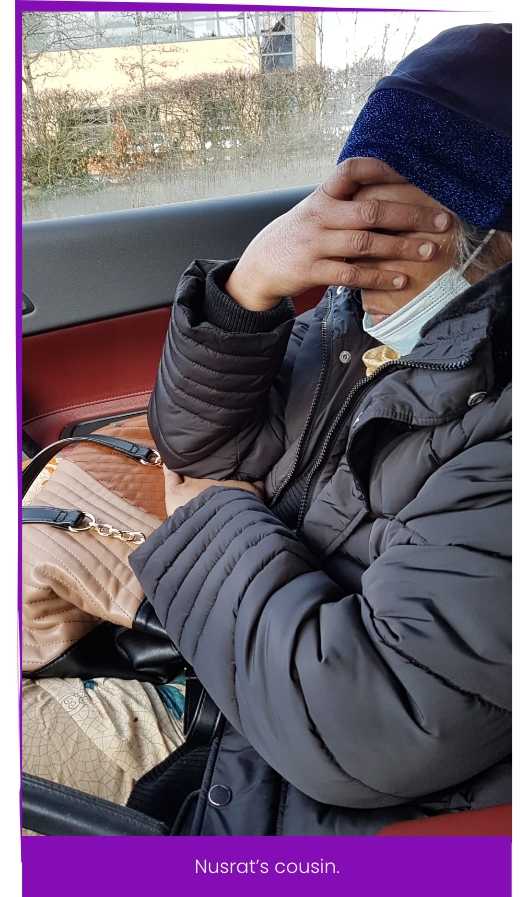
End-of-life treatment is a topic that is stigmatised and really difficult both from an emotional and practical perspective, and caregivers often have a role to play. "At the end the NHS kept asking about the plan for when PatientXx is no longer with us. So, another tough, but necessary task we had to undertake was recording her narrating her will and expressing her dying wish. We needed to ensure that we respected her wishes and preserved all the benefits for her children." – says Nusrat. The community was very supportive, and Nusrat highlights the engagement of the local mosque that helped organise the funeral.
Today working in oncology Nusrat often struggles with “what if” questions, so common for many caregivers, whose loved ones were taken by cancer “With all new drugs coming I keep questioning myself, could she have access to that through clinical trials? Could it have helped her? I have no idea, but that upsets me.” – says Nusrat.
To deal with the loss and get some peace of mind Nusrat spends time in her garden that her daughter is helping her build. Nusrat calls it her moment that counts. “My daughter very kindly has been helping me to build my garden and pergola to hide from the heat. You just sit in peace in the fresh air without feeling overwhelmed. That is my favourite gift of all time that my daughter has given me.”
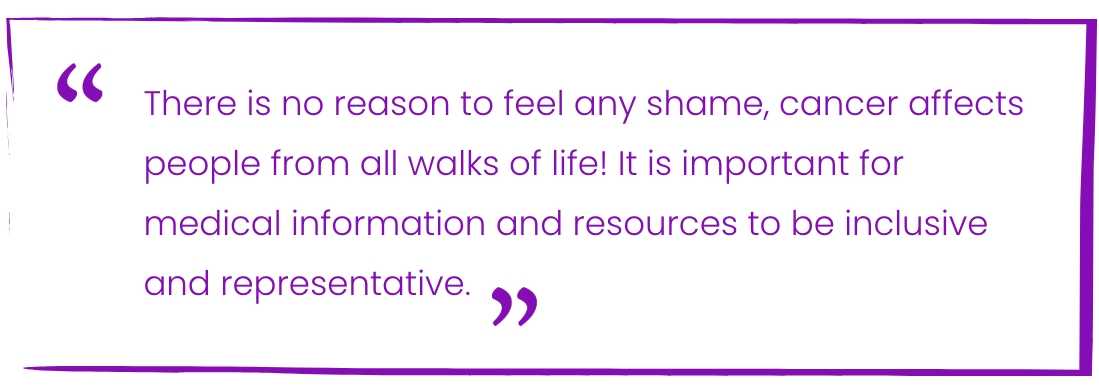
Despite all the challenges patientXx and Nusrat were experiencing every day, they managed to have their small joyful rituals that brought them closer and became moments that count for Nusrat even after her cousin was gone. “Coming back from the consultations, I'd always take her to the shops and encourage her to treat herself and take whatever she wanted. She’d refuse at first and then she'll come out with loads of bags full of everything tasty and sweet. I think she was quite a sweet tooth, and what she’d always buy was pears. There is this kind which is very common in Pakistan that she loved and that really helped her with nausea.”- Nusrat still goes to that shop now, and when she does, she always remembers her cousin.
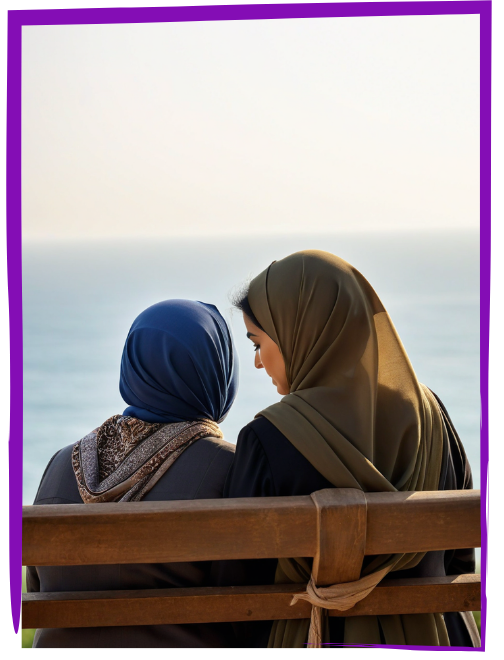
Nusrat’s advice to other members of the South Asian community going through breast cancer diagnosis is to seek information and guidance from professional websites and healthcare professionals. While hope and faith are important, it is crucial to be mindful of alternative treatments, “potions and lotions” as she calls them, as well as religious practices, as they may have an unintended impact on the medical treatment.
Breast cancer is stigmatised in many communities, and it is essential for patients to have open and honest discussions about their experiences with breast cancer and not be ashamed or afraid to talk about their journey. “There is no reason to feel any shame, cancer affects people from all walks of life! It is important for medical information and resources to be inclusive and representative, featuring leaflets and stories of patients who look like me or belong to similar backgrounds,” says Nusrat – “I encourage everyone to share their stories to make healthcare information more inclusive and accessible for all.”
Your healthcare team is your best resource throughout your treatment. Talk openly and often with them about your doubts, questions and concerns. We have developed a guide to support you in having these conversations with some tips to help you find the information you need.
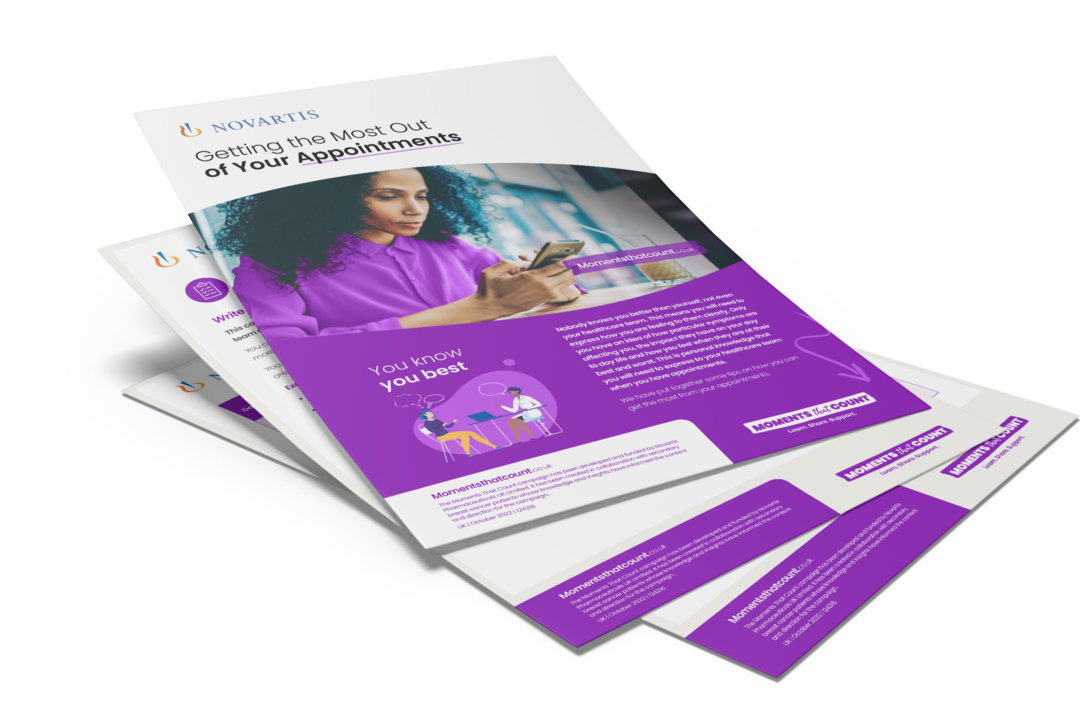
You may also like...
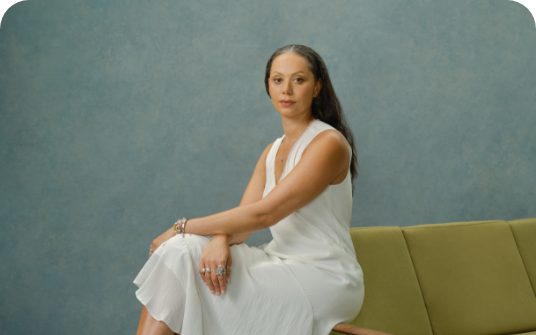
Nina's Story
Nina’s story is one of strength and perseverance, where she demonstrates every day that breast cancer does not define who you are.
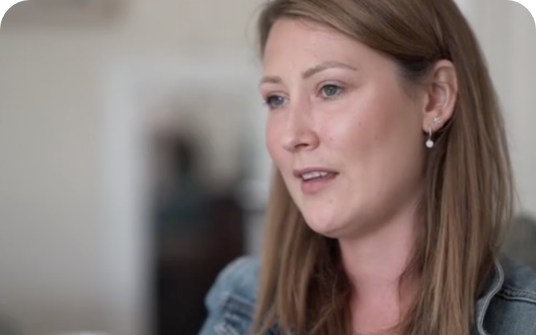
Crucial conversations in breast cancer
Discover how speaking openly and honestly about your needs and intimate subjects can help you on your journey.
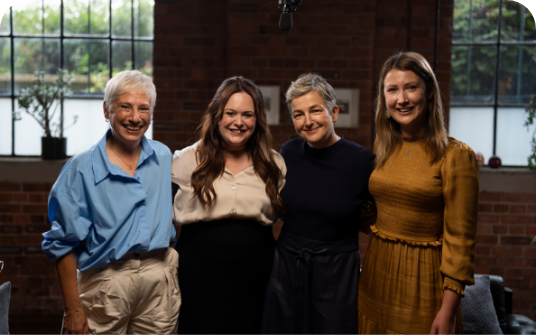
One year on…
Every moment matters in the lives of women with secondary breast cancer. From the time spent during appointments, learning about your condition, to the evenings shared with loved ones, laughing on the sofa.
UK | June 2024 | 375461
Moments That Count has been developed and funded by Novartis Pharmaceuticals UK Limited. It has been created in collaboration with secondary breast cancer patients whose knowledge and insights have informed the content and direction for the campaign.
This website is part of a programme that is funded by Novartis Pharmaceuticals UK Limited. Novartis Pharmaceuticals UK Limited is a private limited liability company registered in England and Wales under number 119006. Registered office 2nd Floor, The WestWorks Building, White City Place, 195 Wood Lane, London, W12 7FQ. Use of this website is governed by our Terms of Use and the Cookies and Privacy Policy.
Reporting side-effects
If you get side effects with any medication you are taking, talk to your doctor, pharmacist or nurse. This includes any possible side effects not listed in the information leaflet that comes in the pack. You can report side effects via the Yellow Card Scheme at www.mhra.gov.uk/yellowcard. By reporting side effects, you can help provide more information on the safety of your medication.
©2024 Novartis Pharmaceuticals UK Ltd - UK | April 2025 | 124182-5 This site is intended for a UK general public audience.
